Review| Transformers: The Last Knight
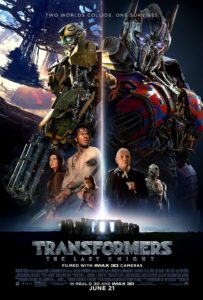 Out of all of my fellow Reel World Theology contributors, I can probably say with a degree of certainty that I’m alone in my admiration of director Michael Bay, or at least in a substantial minority. In fact, when Transformers: The Last Knight was up for grabs to be reviewed for RWT, there wasn’t that much of a race to claim it. I don’t blame them; he’s definitely an acquired taste.
Out of all of my fellow Reel World Theology contributors, I can probably say with a degree of certainty that I’m alone in my admiration of director Michael Bay, or at least in a substantial minority. In fact, when Transformers: The Last Knight was up for grabs to be reviewed for RWT, there wasn’t that much of a race to claim it. I don’t blame them; he’s definitely an acquired taste.
The Transformers series, in particular, is quite a lot for people to swallow. The first film is a fun popcorn movie with sincerely beautiful moments of awe and wonder (the whole sequence of the Autobots arriving on earth is one of the greatest movie moments of the 21st Century!). The lead human characters are funny and, at times, endearing. And the action sequences are among Bay’s most intense and fun.
The sequels are another story.
I must admit that, as flawed as the films are, I do have a mild appreciation for the Transformers sequels. I compare them to a roller coaster. Unlike the more elaborate theme park attractions that are at the Disney or Universal parks (which take the rider on a journey within some kind of thin narrative), roller coasters are built to simply thrill, wow, and take people for a ride. I’m genuinely entertained by the sequels for the visual thrill and spectacle. But with each film, the thrills become lessened.
Which brings us to The Last Knight. As much as I admire Bay and his style, this is probably one of his worst films. Still entertaining in some places, but overall not a very thrilling experience. I should probably blame the screenwriters more than Bay himself because, as he demonstrated with the superb 13 Hours: The Secret Soldiers of Benghazi, when given a good script to match his visuals, he’s a modern action auteur. There’s just very little joy and heart in The Last Knight, and that is its most fatal flaw.
As fun as roller coasters are, it might be time to get off this ride.
Though it’s a disappointment, The Last Knight does have some interesting thematic insights. Specifically, the film reminds us about the importance of stories, and how all tales and legends have a bit of truth to them. This idea is, frankly, the whole reason why I do what I do, and why sites like Reel World Theology exist.
SPOILERS AHEAD!
Stuff I Liked
 As always, Michael Bay does not disappoint when it comes to visual adrenaline. He has a very distinct style, which revolutionized how action films are shot today. Even the coastal cultural elites are now starting to admit that there is something to Bay’s imagery (albeit in a backhanded compliment kind of way). The Last Knight is full of some amazing, sweeping shots. The low angles and constantly-moving camera are Bay’s trademark ways of keeping the frenzied pace of the scene. The way he sets up his all his action shots on the fly and in his head still astounds me.
As always, Michael Bay does not disappoint when it comes to visual adrenaline. He has a very distinct style, which revolutionized how action films are shot today. Even the coastal cultural elites are now starting to admit that there is something to Bay’s imagery (albeit in a backhanded compliment kind of way). The Last Knight is full of some amazing, sweeping shots. The low angles and constantly-moving camera are Bay’s trademark ways of keeping the frenzied pace of the scene. The way he sets up his all his action shots on the fly and in his head still astounds me.
I did enjoy the creative historical connections between the Transformers and humans. It was neat how the writers wove the legend of King Arthur into the Transformers lore. By the way, that entire medieval battle sequence was superbly staged.
Stuff I Didn’t Like
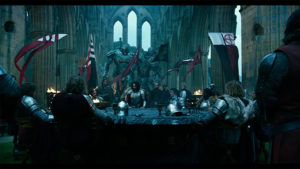 This film is a direct continuation of Age of Extinction, which was the worst film (though this new film is vying for that title), and I think that is The Last Knight‘s biggest problem. When the foundation is built upon something unstable, it’s no surprise that it collapses under its own weight. At least the first two sequels still had some of the goodwill and heart of the first film.
This film is a direct continuation of Age of Extinction, which was the worst film (though this new film is vying for that title), and I think that is The Last Knight‘s biggest problem. When the foundation is built upon something unstable, it’s no surprise that it collapses under its own weight. At least the first two sequels still had some of the goodwill and heart of the first film.
Chief among Age of Extinction‘s flaws was a lack of any real humor, and The Last Knight continues that dubious tradition. The other sequels had moments that were genuinely funny, primarily involving the human characters. I know it may pain some to read this, but I truly miss Shia LeBoeuf and Megan Fox as Sam and Mikaela. They had a real chemistry, charisma and likability which all the new human characters lack severely. Mark Wahlberg is a great actor, but his character is just not very likable.
The same goes for the Autobots. Age of Extinction left most of the metallic heroes from the previous films dead, and what replaced them were the most uninspiring group of Autobots as their lead heroes, and they continued to be just as uninspiring and uncharismatic in The Last Knight. Hound had his moments, but the others were just didn’t have the gravitas of an Ironhide or Ratchet.
One of the saving graces of the previous Transformers films was the characterization of Autobot leader Optimus Prime. Optimus was left intact from the original 1980s cartoon (helped tremendously by the casting of his original voice actor, Peter Cullen): brave, noble, stoic, loyal, and stalwart in the face of adversity. As a kid, I admired Prime, and the filmmakers got a lot of credit from Transformers fans for continuing the character’s captivating personality.
But there were cracks given to Prime in Age of Extinction that were only exacerbated by The Last Knight. These were not just character flaws, which I could understand, but entire personality changes. Optimus was now a dour and conflicted hero, and left earth vulnerable when after his creator. Not only was he temporarily turned into a bad guy in The Last Knight (which was a little uncomfortable to watch), but he was given very little screen time. And then he just shows up on the ancient submerged ship!
Megatron suffered a similar fate, with little to do and very little of his famous personality to show off. And he and Prime squared off only briefly. It was like having Batman and the Joker for 20 minutes in a Batman movie, with a small payoff at the end. There should have been more attention paid to the two main Transformers and less time on the boring humans.
There was an attempt to give The Last Knight some heart with the Izabella and Sqweeks subplot, but it fell completely flat. They felt tacked on and offered little to the plot – only there to be used as a set-up when the time was right. She was annoying and Sqweeks was completely useless until he wasn’t… for some reason. If there is any good to talk about, it’s that the whole “fighting like a girl” bit Izabella spoke of in one of the trailers was mercifully not included the film.
I put the blame primarily on the bevy of screenwriters who worked on this film. As I said earlier regarding 13 Hours, Bay is capable of turning out a great film if given a good, tight script. The script for The Last Knight is nothing of the sort. There are too many subplots and alliances not fully explained to make your head spin (was Lennox working for both the TRF and the US Army undercover with General Morshower? I could never fully understand that).
The Last Knight annoyed the nerdy film fan in me because of the constant change in its aspect ratio. This isn’t a new complaint (it was one of the few annoying parts of The Dark Knight), but it’s very apparent in The Last Knight because of the Bay’s frenetic cutting. One can tell which shots were filmed with IMAX cameras and which were filmed with regular cameras. And they keep cutting back and forth in the same sequence!
Stuff to Ponder
 For being “dumb action movies,” the Transformers films have had a few profound things to say thematically (Pastor James Harleman brilliantly analyzed the first two Transformers films for a Film & Theology series – which is unfortunately no longer available online). Through his unique imagery, Bay infused these films with an emotional streak that strikes a chord with many people. I think that’s one of the reasons (besides the awesome action) that the Transformers series has remained popular since it first hit the theaters a decade ago.
For being “dumb action movies,” the Transformers films have had a few profound things to say thematically (Pastor James Harleman brilliantly analyzed the first two Transformers films for a Film & Theology series – which is unfortunately no longer available online). Through his unique imagery, Bay infused these films with an emotional streak that strikes a chord with many people. I think that’s one of the reasons (besides the awesome action) that the Transformers series has remained popular since it first hit the theaters a decade ago.
In The Last Knight, Sir Edmund Burton explains the long-lost historical connection between Transformers and human beings, going all the way back to King Arthur. Vivian Wembly, an Oxford professor, has difficulty believing the validity of Burton’s claim, given that King Arthur is supposedly a myth, a story. Burton tells Vivian that all stories and myths have a bit of truth to them.
This notion of truth in story is a deeply profound one. It is the reason why people are attracted to certain stories and enjoy experiencing them time and time again through the ages. They may change context and character names, but their base is still very much the same.
My fellow Reel World Theology contributors and I seek to take this notion to the next logical step: that every story told is a reflection of the God who created us. God is a creative being, and our creative impulse is an attribute given to us by God.
We all love stories, and whether they know it or not, filmmakers make, and audiences watch, certain types of movies because of this longing we have. We want to see the villain get it in the end and the hero triumphant. But why? Why are certain stories good and bad? Jesus Himself taught through stories – dramatic parables that conveyed a certain part of God’s character and His reason for coming to earth (The Prodigal Son, The Lost Coin, etc.).
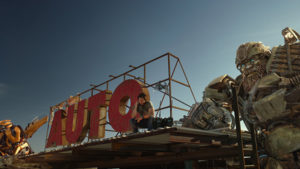 It is because we are made in the image of God, and each of us have a “spark” of the truth within us, whether we believe in Him or not. We know certain things to be right and wrong, and we gravitate toward stories that reflect this innate truth. Stories of self-sacrifice, bravery, honor, justice. Stories of a savior coming to rescue us from a great evil. These are the things we crave in our world because we were made to crave them.
It is because we are made in the image of God, and each of us have a “spark” of the truth within us, whether we believe in Him or not. We know certain things to be right and wrong, and we gravitate toward stories that reflect this innate truth. Stories of self-sacrifice, bravery, honor, justice. Stories of a savior coming to rescue us from a great evil. These are the things we crave in our world because we were made to crave them.
We long to hear tales of a savior because, deep down, we know we need one. And Jesus is that Savior.
So What I’m Trying to Say is
While there are a few enjoyable moments, Transformers: The Last Knight is not a good film overall. With a convoluted (sometimes incomprehensible) plot, weak human characters, and weaker Transformers, it’s probably among Michael bay’s worst films. Perhaps it’s best that Bay hand off the franchise to someone else, as he has stated in many interviews. However, I think the ones that really need to lay off the Transformers are the screenwriters of this movie.
Though it is heavily flawed, The Last Knight does continue the series’ thoughtful thematic underpinnings. This film touches on stories generally, and why we as human beings love to tell, and be told, stories. All legends and tales have a bit of truth to them, even the ones being told today on television and movie screens. And these stories have a certain connection to our Creator – the One who gave us our creative “spark.”


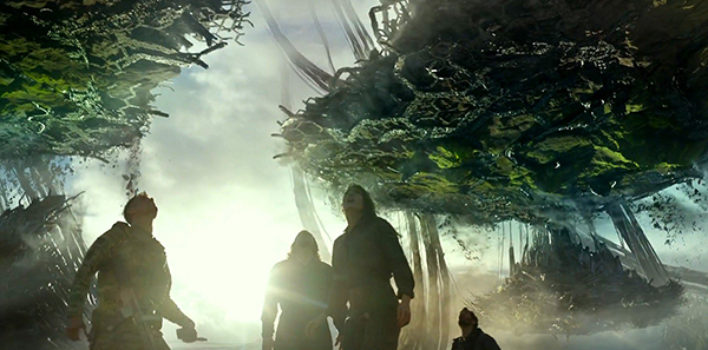

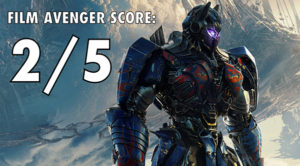





I am not ashamed to admit I enjoy these films as well.
Thanks for the review. Just one push back. The theatre I was in were laughing quite a bit. I actually thought this film was quite good on the humour level. Hopkins steals the show in my opinion, and a great C3PO impersonation with a little bit of Bondish like qualities thrown in for good measure.
I too enjoyed Cogman. He was a bright spot in a relatively joyless film. As far as Hopkins was concerned, I didn’t find him all that funny. His intonations rarely changed and I couldn’t tell when he was trying to be funny or serious. I still enjoyed him being in the film, and he looked like he was having a good time.